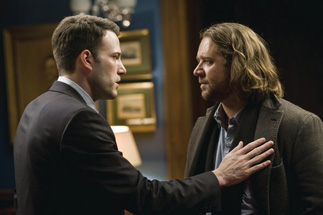Movie Review - State of Play
By Matthew Huntley
April 27, 2009
BoxOfficeProphets.com

Fortunately, State of Play convinces us its events aren't beyond a real-life political conspiracy. It only descends into standard Hollywood thriller mode once, but even then, it's still entertaining and quite effective.
Russell Crowe plays Cal McAffrey, a sneaky yet determined reporter who will do just about anything to find his story, even if it means putting his own life in danger. He's not married and he doesn't have kids, so he probably thinks dying for a story would be worth it so long as it gets written.
Cal works for the Washington Globe, and while driving to work in his 20-year-old SAAB, he stumbles upon a crime scene, or as Cal would like to think of it, a juicy story waiting to happen. A homeless black man has been murdered and a white pizza delivery boy, who witnessed the crime, lies in critical condition after being shot in the back. Lucky for Cal, he's friends with the on-site detective (Harry Lennix), who gives him the inside scoop.
That same morning, a young, redheaded woman named Sonia Baker (Maria Thayer) is killed on the D.C. metro line, although nobody knows exactly what happened since the incident took place in one of the metro's three blind spots. Sonia's death, of course, is high profile because she was the chief researcher and mistress to Congressman Stephen Collins (Ben Affleck), a clean-cut hotshot who served in the Gulf War. Collins has been leading a committee that wants to prevent corporations from privatizing homeland security.
It just so happens Cal was Stephen's college roommate, and both have also found themselves in love with Cal's wife, Anne (Robin Wright Penn). When Cal and the Globe's gossipy on-line reporter, Della Frye (Rachel McAdams), start researching the street shootings and Sonia's death, they start to make connections between the two. The pressure is put on them to find a story from their chief editor, Cam (Helen Mirren), who must answer to the paper's new management. The Globe has been recently bought by a media organization and needs to start selling newspapers in order to justify its own existence.
State of Play is based on the six-part miniseries that aired on the BBC in 2003. This updated version was directed by Kevin Macdonald, who specializes in films that contain both a human and social element. His Touching the Void (2003), a documentary about two mountain climbers facing near death in the Peruvian Andes, and The Last King of Scotland (2006), with a terrifying, Oscar-winning performance from Forest Whitaker as Idi Amin, both dealt with real-life events and people, but Macdonald made them accessible to a broad audience by placing them within familiar narrative structures. Even though they were traditionally told, their subjects were completely distinguishable and captivating.
The same goes for State of Play, which is surprisingly grounded for a Hollywood thriller. Macdonald does not seem interested in dressing his film with overwrought flashiness, pumped up music or extended chase sequences. The characters also don't behave according to conventional Hollywood archetypes. They're more raw and focused. For instance, it would be quite easy for the screenplay to set the Crowe and McAdams characters up to be romantically involved, that we'd get one scenes of hot, passionate sex before they solve the case, but no, the film focuses on its message, which is about the news ethics, the declining newspaper industry and the negative effects of globalization. Through all of this, Macdonald gives his major characters enough screen time so we grow to care about them and not just view them as pieces of the plot, which we remain curious about.
If the film has any flaws, and it does, it's that Macdonald sometimes directs with too low of energy and doesn't take many risks with his storytelling. The film is always interesting and it holds our attention, but all of its events more or less happen on a straight line. There's little fluctuation or bold occurrences with the way it's presented to us. That's not necessarily a bad thing, but it prevents the film from being more biting and exciting than it is. Still, it's evident that everyone who worked on it really believed in the material and, by the end, so do we.